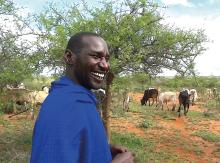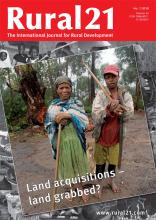Land Library
Welcome to the Land Portal Library. Explore our vast collection of open-access resources (over 74,000) including reports, journal articles, research papers, peer-reviewed publications, legal documents, videos and much more.
/ library resources
Showing items 1 through 9 of 12.The Mekong Region Land Governance (MRLG) project and the Forestry Department of the Ministry of Natural Resources and Environmental Conservation (MONREC) co-hosted the “Mekong Region Customary Tenure Workshop” on 7-9 March 2017 in Nay Pyi Taw, Myanmar.
Summary report of Mekong Region Land Governance (MRLG)'s online dialogue on 'Recognition of Customary Tenure in the Mekong Region' held in 2017, containing justification for the dialogue, key take-aways, next steps and recommended resources, published by MRLG in 2017.
Indigenous Peoples and local communities hold a large share of the world’s land area under customary systems. However, there is a tremendous gap between what is held by communities in practice and what is formally recognised by governments.
The year 2016 marks 15 years since the new wave land reforms became operational in Tanzania. Despite its ambitious goals – encouraging land registration and titling, and empowering women and other vulnerable groups – the results are disillusioning.
This paper describes the current challenges Myanmar faces to shift to a system more inclusive of multiple interest groups. The authors provide background on the situation in Myanmar and its past levels of performance.
A letter from the Prime Minister dated 16 January 2008, and cited in the Constitution Court Ruling No 15/2552, in defense of the Community Forest Bill shows how “community rights” are often seen as contingent upon the responsibility of the communities to take care of the forest.
Conflict over land, combined with the systematic violation of land rights, is one of the most prominent human rights problems faced by Cambodians. The root of this problem can be traced back to the abolition of private ownership by the Khmer Rouge in 1975.
In recent years the government of Laos has provided many foreign investors with large-scale economic land concessions to develop plantations.
In many Asian, African, and South American nations, indigenous people are being driven from their homes: Government authorities are leasing hundreds of thousands of hectares of land belonging to indigenous people who only in the rarest of cases possess deeds to the land that are recognised by the




